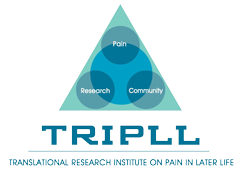The number of older adults living with chronic pain is significant [1,2]. As the population continues to age, this number is likely to increase [3]. Practices surrounding pain management are varied and include pharmacotherapies (e.g., opioids, nonsteroidal anti-inflammatories, anticonvulsants), psychotherapy, and other supportive, complementary treatments such as physical therapy, acupuncture, and massage. Given the substantial number of aging adults living with chronic pain, rising health care costs, and a shortage of caregivers to help care for these individuals, many experts have asked whether emerging technologies, in particular mobile health (mHealth) devices, can help to address these important and related challenges [4,5]. Although the preliminary feasibility and acceptability of various mHealth technologies have been established in small studies, there are limited examples of high-quality research demonstrating that technology-based interventions are effective in reducing pain, associated symptoms, and treatment-related side effects [6].
Elissa Kozlov, M Carrington Reid; Developing mHealth Applications for Older Adults with Pain: Seek Out the Stakeholders!, Pain Medicine, , pny070, https://doi.org/10.1093/pm/pny070
Click here to read full article.
